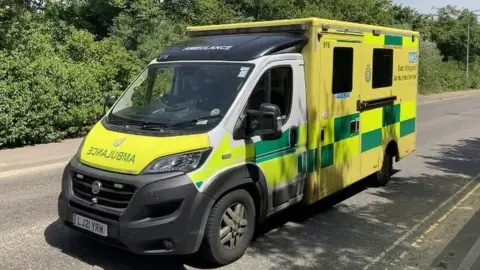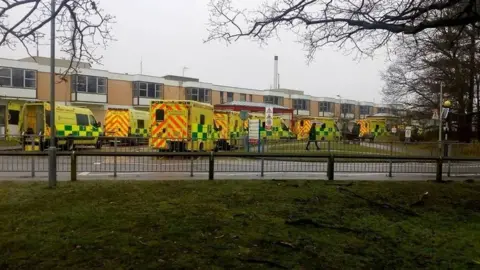East of England Ambulance Service shows signs of improvement
 BBC
BBCThe performance of a struggling ambulance trust is getting better in places, according to the Care Quality Commission (CQC).
The regulator has kept the East of England Ambulance Service Trust's (EEAST) overall rating of "requires improvement" following an inspection.
But it found progress had been made in addressing aspects of its culture.
EEAST chief executive Tom Abell said this was just the first phase of a plan to turn the trust around.
The trust was placed in what used to be known as "special measures" in 2020 due to concerns over its leadership and widespread allegations of bullying and harassment.
The CQC has decided to keep the service in this regime, now known as the Recovery Support Programme (RSP), following inspections in April and May.
But it said there had been "marked improvements" on the issues that led to it being placed in RSP in the first place.
The report highlighted a number of significant problems which still persist at the trust including:
- Unacceptable staff shortages which meant patient safety could not be ensured
- Delays in reaching patients
- Mandatory training targets not being met - safeguarding training had a 58% compliance rate against a trust target of 95%
- Management "didn't always understand or manage the priorities and issues the service faced"
- Staff not feeling respected, supported or valued
 Anita Hodgson
Anita HodgsonInspectors also said not enough had been done to address what they described as the trust's "culture of bullying".
However, staff were praised for the care they provided to patients, with their approach described as compassionate and kind.
Concerns and complaints were taken seriously and learned from, the CQC said.
There was also more stability among the trust executive team and board according to the report.
Zoe Robinson, the CQC's head of hospital inspection, said: "While there have been improvements at the East of England Ambulance Service, there is still work to do.
"We also found staff didn't always feel respected, supported or valued. More work is needed to develop staff, enable them to innovate and bring about positive change within the service.
"The trust's improvements are encouraging, and we have told it where it must do more."
'Significant progress in tackling bullying and harassment'
 EEAS
EEASIn 2021, the trust was forced to take action over "high levels" of sexual harassment and was stripped of its ability to train apprentices because of inappropriate behaviour.
This latest report described how services had been impacted by the provider experiencing significant delays in delivering apprentice training.
It also described how "some staff told us there was a network of managers that had known each other for years and that these networks suppressed change from happening across the services".
But the inspectors were also told by staff that there had been an improvement regarding bullying and harassment.
EEAST chief executive officer Tom Abell said he was pleased the CQC had recognised the hard work of staff who were under significant pressure and the "marked improvements on what we have needed to address from previous inspections".
"We have focussed on providing our people with a safe and supportive workplace and there are early indicators this is beginning to have a positive impact - making significant progress to tackle bullying and harassment," he added.
Mr Abell said: "We recognise that this is only the first step in our work to improve our culture and our service and we have a 3-5 year plan in place to fully address all of the challenges we face".

Find BBC News: East of England on Facebook, Instagram and Twitter. If you have a story suggestion email [email protected]
